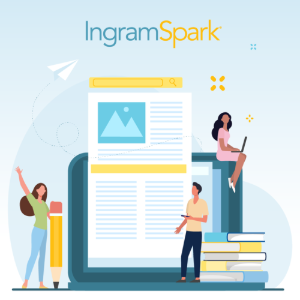Influencer marketing has become a powerful tool for businesses of all sizes, but navigating the landscape can be tricky. Whether you're an author promoting your latest novel or a publisher promoting your backlist titles, understanding how to leverage influencer partnerships effectively is key.
We asked Emily Davis, who created the influencer marketing program for IngramSpark, to break down 4 essential tips to help you launch a successful influencer marketing campaign, from identifying the right influencers to crafting compelling collaborations that resonate with your target audience.
Focus On Community, Not Just Sales
Increasing sales is, of course, the intent of any marketing campaign, but influencer marketing offers much more than just a short-term revenue boost. “Obviously selling more and creating a revenue stream is the end goal, but creating a community in an online space is such a valuable asset, fostering strong relationships and brand loyalty,” says Davis. “Readers may discover authors and brands through their books, leading to expanded audience reach and new opportunities for engagement.”
Data from GRIN indicates that influencer marketing campaigns generate 11.4 times higher ROI (Return on Investment) compared to traditional advertising, largely due to the fostered brand loyalty and community engagement. Influencer marketing campaigns may be time consuming on the front end while you find the right influencer and learn each other’s rhythms, but the payoff can be huge in terms of not just sales, but also awareness and expanding your audience.
Chase The RIGHT Numbers
Even the most well-intentioned influencer marketing campaigns can falter if you fall into common traps.
"Don't get fixated solely on follower counts," advises Davis, “focusing only on influencers with large followings and overlooking the potential of micro-influencers who have smaller but highly engaged and niche audiences. Micro-influencers often offer higher levels of engagement and authenticity, making them valuable partners for book promotion campaigns.”
Micro-influencers, who tend to have more targeted and niche audiences, can be far more valuable partners than mega-influencers with less engaged followings.
A study by Influencer Marketing Hub found that micro-influencers (with 10,000-50,000 followers) typically generate engagement rates of 8-16%, compared to just 1.7% for influencers with over 1 million followers.
No matter the size of influencer, however, don’t have unrealistic expectations about the immediate impact of influencer marketing on book sales or brand awareness. “Building a meaningful presence through influencer marketing takes time and requires consistent effort and investment in building relationships and engaging with the audience,” Davis emphasizes.
Match Your Book with the Right Influencer
Choosing the right influencer can make all the difference. To maximize relevance and effectiveness, you should choose influencers whose audience closely matches the target demographic for the book. Here's what to consider, as recommended by Davis:
- Audience Demographics: Align the influencer's audience with your target readers. Consider age, location, interests, and even buying behaviors. This ensures your book reaches the right people who are most likely to connect with it.
- Content Alignment: The influencer's content should resonate with the genre, theme, and overall message of your book. Look for influencers who consistently create content that aligns with your book's target audience.
Success Is More Than Sales
While sales figures are important, they aren't the only indicator of a successful campaign. Here are some key metrics to keep an eye on, as suggested by Davis:
- Focus on metrics such as impressions, follows, likes, comments, shares, and saves on the influencer's posts promoting your book. High engagement indicates that the content resonated with the audience and sparked conversation.
- When an influencer endorses your work, it lends credibility and authenticity, especially for new readers encountering your book for the first time. Word of mouth marketing is such an effective tactic because, in general, we trust a recommendation by a real person over any type of paid advertising. Influencer marketing hits that target for their audience; book influencers act as trusted curators, recommending books they genuinely enjoy.
Bonus Tip from Emily:
“Start small! You don't have to dive into influencer marketing with a big budget or high-profile influencers right away. Consider starting with smaller-scale campaigns or partnering with micro-influencers who have smaller but highly engaged followings. This can help you test the waters and see how influencer marketing works for your book without a significant financial commitment.”
By understanding the true potential of influencer marketing, avoiding common pitfalls, and strategically partnering with the right influencers, you can leverage this powerful tool to not only boost sales but also to cultivate a thriving community of readers who are genuinely invested in your work.












